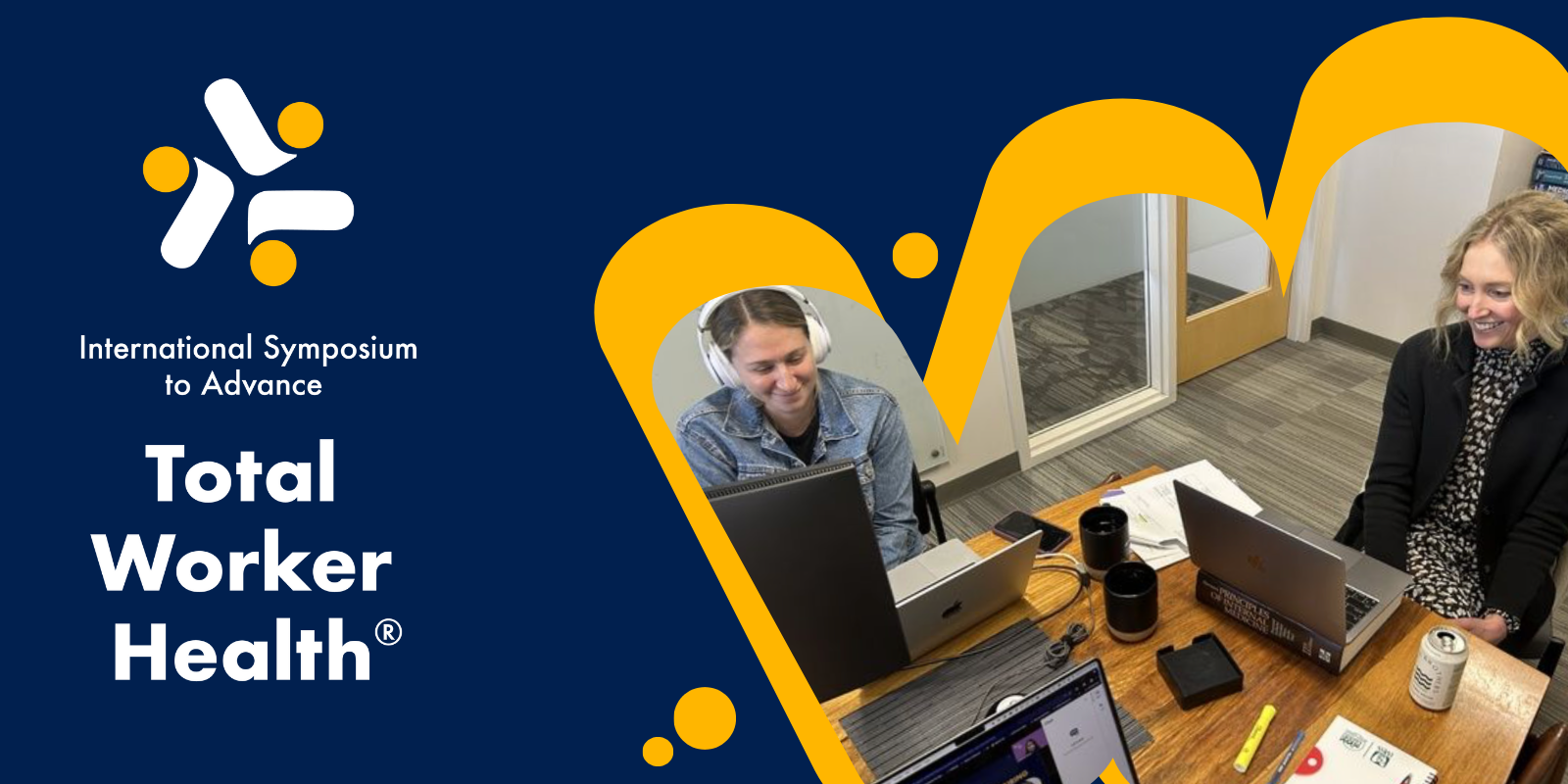The Total Worker Health® Pilot Project Program offered through the Centers for Health, Work & Environment, has awarded funding to two innovative projects aimed at enhancing the well-being of essential yet underserved worker populations. Awarded leads of these two projects, Lisa Gonzales and Sara Kohlbeck, share more details about their research and what excites them most about their projects. Their responses provide a glimpse into the goals, target populations, and innovative activities designed to improve well-being in challenging work environments.
Introducing the 2024 Awardees of the Total Worker Health® Pilot Project Program
The first initiative, the Fostering Resilience in Early Education for Migrant and Seasonal Head Start programs (FREE-M), focuses on supporting the mental health of early care educators working with migrant communities in Colorado. This project, led by Lisa Gonzales, MPH, (image left) and Emily Mauirro, MS, adapts a proven program to fit the unique needs of this group, ensuring educators have access to mental health resources and well-being practices that can positively impact both their lives and the young children they care for.
In a separate Total Worker Health (TWH) funded project, immigrant dairy farmworkers in Wisconsin—a population facing significant health and safety challenges—are the focus. This initiative, the Immigrant Farmworker Behavioral Health Promotion (IFBHP), led by Sara Kohlbeck, PhD, MPH (image right), aims to reduce work-related stress and improve access to mental health resources for dairy workers while educating farm owners on best practices to support their teams. Together, these two projects exemplify how the TWH Pilot Project Program fosters new approaches to worker health and safety by addressing mental health in diverse, high-need sectors.

Q: Congratulations on receiving the TWH Pilot Project Program grant award! Can you tell us about the main goal of your pilot project?
Lisa Gonzales: Thank you so much. The Fostering Resilience in Early Education (FREE) program was developed in 2020 (co-PIs: Emily Mauirro, Jini Puma, and Charlotte Farewell). FREE is a multi-level early care and education (ECE) based intervention. The main goal of the FREE-M project is to adapt the FREE program for Migrant and Seasonal programs to ensure providers have access to support that can improve their mental health and well-being.
Sara Kohlbeck: Thank you! The main purpose of our project, the Immigrant Farmworker Behavioral Health Promotion (IFBHP), is to improve the mental health of immigrant dairy farmworkers in Wisconsin by providing targeted education, resources, and opportunities for connection to both immigrant dairy farmworkers themselves and also to educate farm owners and managers on how to best support these workers.
Q: Who is the target population for your study, and how did you come to focus on food truck workers?
Gonzales: The target population for our FREE program is the Migrant and Seasonal ECE providers and students in rural Southeast Colorado (FREE-M). Over the past four years, with funding from the Buell Foundation and other Colorado-based foundations, we have provided FREE programming to staff and students who attend school throughout the traditional school year (August through May). This funding will allow us to adapt and implement programming with Migrant and Seasonal ECE providers and families who attend school in the summer months.
Kohlbeck: The target population for our IFBHP study is immigrant dairy farmworkers (IDFs) working in Wisconsin. Farmworkers are among the least protected workers in the U.S.; agriculture is partly or fully exempted from most state and federal protections on wage and hours, child labor laws, health and safety enforcement, and workers’ compensation. Farming has always been among the highest-risk occupations, and the exigencies of modern farm operations can perpetuate unsafe, unhealthy, and unsustainable working conditions. IDFs often face these stress-inducing job demands, in addition to physical strain and legal vulnerability.
As immigrants living on-site or around farms in rural Wisconsin—and frequently barred from obtaining a driver’s license-- they are often linguistically, culturally, and geographically isolated. These risk factors combine to make IDFs particularly susceptible to depression, anxiety, and substance use. These risks are compounded by the extremely high rates of occupational injuries among dairy workers (twice the industry rate overall, which can further leave workers struggling with chronic pain, disability, and lost wages.
Q: Can you walk us through the key activities of your study?
Gonzales: The FREE-M study aims to improve the overall mental health and well-being of the Migrant and Seasonal Head Start workforce. Our first aim is to adapt and condense the FREE curriculum to be relevant and feasible for these settings. We will partner with two Migrant and Seasonal Head Start centers (n=26 ECE providers) and collect formative data to inform the adaptation of the FREE program.
The second aim has two components to implement the adapted curriculum, FREE-M, with the target population. The first component is focused on adult well-being practices and will include an evidence-based strategic planning process to implement policy, system, and environment (PSE) changes that promote ECE provider well-being. The second component is classroom-based and provides mindfulness activities in each classroom, including 5 structured mindfulness activities to implement with the children in their care.
Kohlbeck: The first key activity for the IFBHP study is to enhance dairy farmers’ capacity to lower the stresses on their workforce. We plan to do this by increasing dairy farmer awareness of the sources and impact of stressors facing IDFs and offer a variety of feasible solutions that farmers can implement to help reduce unnecessary stress. We will also connect dairy farmers with information and resources to deepen and sustain their support for IDF behavioral health.
The second key activity of our project is to expand the number of support resources available to IDFs in Wisconsin. We plan to do this by integrating information on behavioral health resources and support into IDF onboarding activities at Wisconsin dairy farms. We will also create opportunities for IDF connections across farms by hosting training events that will include a social component to increase a sense of connection and belonging.
Q: What are you most excited to learn from this project?
Gonzales: We know that the first five years of life are crucial in children’s development, and we also know that Early Childhood Educators play a role in a child’s early childhood development. We are excited to work with the Migrant and Seasonal ECE community to adapt the FREE program and then implement and evaluate the adapted program to see if the FREE-M will positively impact Migrant and Seasonal Head Start providers' health and well-being.
Kohlbeck: We are very excited to learn methods to best support IDFs in Wisconsin so that we can expand this work to additional regions in our state. As noted, this is a particularly vulnerable group, and we believe that by learning how to support IDFs and provide opportunities for connection, we can make a difference in the mental health of our farming community.
Q: How does receiving the TWH Pilot Project Program grant support your research?
Gonzales: The TWH Pilot Project Program grant provides funding to expand our work with Migrant and Seasonal Head Start providers. Funding will allow us to provide materials (mindfulness materials and resources for staff, children, and the classroom environment) and support to improve the overall mental health and well-being of the ECE workforce and the children in their care.
Kohlbeck: For the IFBHP study, the TWH Pilot Project Program grant s allow us to bring specialized training and resources to farm owners, managers, and IDFs. Additionally, this award supports our work by allowing us to expand our education and connection opportunities to multiple large farms across Wisconsin. This would not have been possible without this award.
About the Total Worker Health® Pilot Project Program
The Total Worker Health® Pilot Project Program, offered through the Centers for Health, Work & Environment, provides funding to select pilot projects focused on advancing research and research-to-practice (r2p) initiatives in the emerging field of TWH. Defined by the National Institute for Occupational Safety and Health (NIOSH), TWH encompasses policies and practices that integrate protection from workplace hazards with strategies that promote broader health and well-being. Rather than focusing solely on individual behaviors, the TWH approach targets working conditions—such as physical and psychological factors and work organization—to enhance worker well-being holistically. This program underscores a comprehensive, systems-oriented approach that considers the full spectrum of worker health: physical, mental, social, and financial. Learn more about this pilot project grant here.
About the Centers for Health, Work & Environment
The Centers for Health, Work & Environment are a part of the Colorado School of Public Health. As one of 10 Centers of Excellence for Total Worker Health® and home to the Mountain & Plains Education and Research Center (MAP ERC). The Centers work with faculty, students, and community partners to advance worker health, safety, and well-being. We are committed to developing education, research, and public health practice initiatives that address racial and environmental inequities and injustices facing workers. To effectively address the future of work, we strive to ensure a healthier and safer workplace for all.
The Centers’ main offices are located at the University of Colorado Anschutz Medical Campus in Aurora, Colorado.
Funding Acknowledgement
This pilot funding is supported by two grants from the National Institute for Occupational Safety and Health (NIOSH) - Center of Excellence for Total Worker Health® and Mountain & Plains Education and Research Center (MAP ERC).






